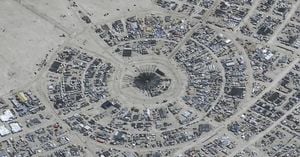Long delays and protests have erupted over increased vehicle inspections at the Reynosa-Hidalgo international bridge, significantly impacting commuters and local communities. The National Guard's recent operational rollout has turned routine crossings, particularly through the SENTRI lane, which is usually meant for expedited transit, contentious and time-consuming.
The heightened security measures were initiated as part of the federal government’s Northern Border program, which aims to detect illegal arms and drug trafficking, as well as unauthorized migration. Yet, many users, including parents commuting to educational institutions across the border, are finding the process increasingly unbearable.
Reports indicate wait times have ballooned to over six hours, with numerous complaints streaming through social media and local news outlets. Manuel, who relies on the SENTRI lane, shared, "I’ve been here since 2 PM, and it’s now 5:30, and I still haven't crossed. It’s frustrating!" Another affected individual, Guillermo, stated, "I’ve waited two and a half hours, which is excessive for what should be the fast lane. I’ve never experienced anything like this before.”
Additional distress is voiced by mothers and seniors, who heavily rely on this route. Rosa María lamented, "It’s chaos; we’re waiting two hours here after we’ve already paid and had our paperwork checked to use this lane. What’s the point?" A social media user noted the perceived mistreatment during inspections, stating, "It's abuse. They check everything, even the hood—children and elderly passengers suffer through this without consideration.”
Reflecting growing discontent, both local citizens and business sectors are calling for the federal government to reevaluate its security strategy, proposing instead to divert National Guard forces for surveillance at the banks of the Rio Bravo. Denisse Ascencio, one of the frustrated parents, emphasized, "We’re requesting the checkpoint at SENTRI be reconsidered. It feels unnecessary because we've all been vetted to access this privilege."
Protests have been reported as groups gather near the Reynosa-Hidalgo bridge to voice their dissatisfaction with the new measures. Participates share stories of long waits and disrupted schedules, illuminating the impact of these security adjustments on daily life. Marcela González, affected by the delays, exclaimed, "I’ve never faced such long delays—I spent nearly three hours just to pass!"
The consequences of the inspections ripple beyond individual troubles. The impacts reach the educational sector, as children struggle to cross on foot, facing potential safety risks. Erika Rodríguez highlighted parents' concerns, stating, "It’s become so chaotic—my children are crossing on foot, which is dangerous considering some are young and traveling alone or with older peers.”
This discontent has sparked urgent calls for traffic enforcement from local deputies to manage the chaotic situations arising as frustrated drivers navigate the prolonged waits, often staging illegal maneuvers, including double parking and cutting lines. Observers warn such behaviors could potentially create hazardous conditions around the border checkpoint.
The government has yet to issue any official statements addressing the public outcry or whether there will be any changes to the current security drill. This silence only fuels public frustration as commuters await any sign of resolution. Meanwhile, demonstrations continue, accentuating the community’s demand for enhanced reliability and efficiency when crossing the border.
While the intentions of the National Guard's increased security measures may center on community safety, the accompanying delays are causing citizens to question their methods and the relevance of such disruptions.



